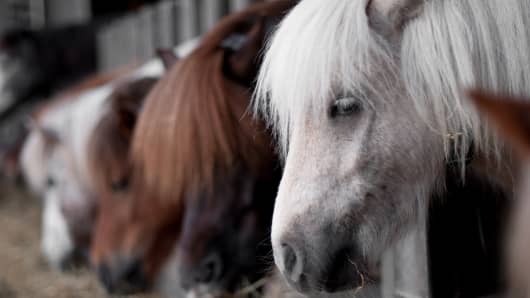Federal officials cleared the way Friday for a return to domestic horse slaughter, granting a southeastern New Mexico company's application to convert its cattle facility into an equine processing plant.
In approving Valley Meat plans to produce horse meat, the Department of Agriculture also indicated it would grant similar permits to companies in Iowa and Missouri as early as next week.
With the action, the Roswell, N.M., company is set to become the first operation in the nation licensed to process horses into meat since Congress effectively banned the practice seven years ago.
Valley Meat has been fighting for approval from the Department of Agriculture for more than a year with a request that ignited an emotional debate over whether horses are livestock or domestic companions.
The decision comes more than six months after the company sued the USDA, accusing it of intentionally delaying the process because the Obama administration opposes horse slaughter.
The wants to ship horse meat to countries where people consume it or feed it to animals. Horse meat is eaten in a number of countries, including France and Italy.
In a statement, the company said it was "encouraged that after well over a year of delay that the process has finally reached completion. Valley will now begin final preparation to hire 40 to 100 employees over the coming weeks and months so that they may go to work providing a humanely harvested, safe, legally compliant product to the world markets."
Although the USDA approved the certification, it was unclear when Valley Meat would be able to begin slaughtering. Blair Dunn, attorney for the company, said the department must send inspectors to the plant before it can begin operating.
The plant would become the first horse slaughterhouse to operate in the country since Congress banned the practice by eliminating funding for facility inspections. Congress reinstated funding in 2011, but the USDA has been slow in granting permits permit, citing the need to re-establish an oversight program.
The USDA said it expects to issue permits next week for Rains Natural Meats in Missouri and Responsible Transportation in Iowa.
Meanwhile, the USDA continues to push for an outright ban on horse slaughter, and the Obama administration's budget proposal for the upcoming fiscal year eliminates funding for inspections of horse slaughterhouses, which would effectively reinstate a prohibition on the industry. Both the House and Senate agriculture committees have endorsed proposals that would cut the funding. But it is unclear if an agriculture appropriations bill will pass this year.
"Since Congress has not yet acted to ban horse slaughter inspection, [the USDA] is legally required to issue a grant of inspection today to Valley Meats in Roswell, N.M., for equine slaughter," said USDA spokeswoman Courtney Rowe.


